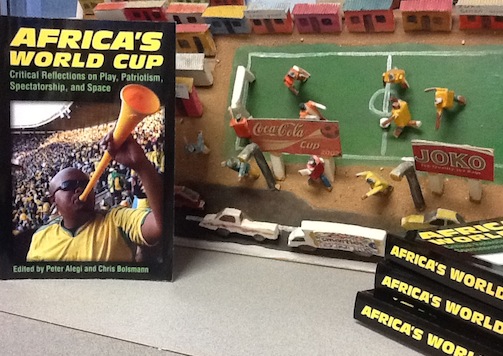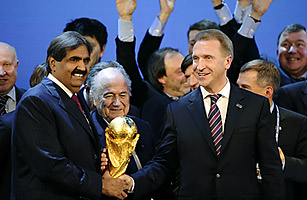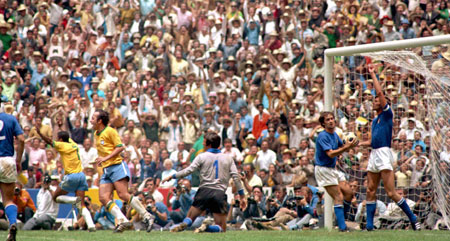 There may not be any white smoke coming out of the soccer conclave this week at Hofstra University in New York, but little else will be missing from an unprecedented fútbological event featuring presentations by more than 100 scholars, journalists, authors, coaches, and the King of Soccer himself: Pelé.
There may not be any white smoke coming out of the soccer conclave this week at Hofstra University in New York, but little else will be missing from an unprecedented fútbological event featuring presentations by more than 100 scholars, journalists, authors, coaches, and the King of Soccer himself: Pelé.
Historians Brenda Elsey and Stanislao Pugliese are the presiding cardinals of Soccer as the Beautiful Game: Football’s Artistry, Identity and Politics , an international conference hosted by the Hofstra Cultural Center and the Hofstra Department of History. The gathering begins on Thursday, April 10, with concurrent panels, an opening ceremony, and two keynote addresses by David Goldblatt (“Brazil: The Curious Rise of the Futebol Nation”) and Jennifer Doyle (“Imagining a World Without a World Cup: An Abolitionist Perspective).
Friday’s menu serves up a plethora of panels on a dizzying range of topics and a ceremony honoring Pelé with the conferral of an honorary degree. Saturday’s focus is on journalists, coaches, philanthropy round-tables, followed by a concluding plenary session, and . . . a pickup game on the New York Cosmos home ground! (Note to self: remember to pack turf shoes.)
I’ll be presenting a paper comparing World Cup 2010 in South Africa to World Cup 2014 in Brazil (click here to listen to an earlier version of this talk) and also participating in the Football Scholars Forum on academic vs. journalistic writing about soccer (click here to watch my pre-conference video blog and here to read the other five posts by my fabulous co-panelists).
Tag: World Cup
Futebol Nation: The Story of Brazil
The Garrincha of futbology, David Goldblatt, admits he’s neither Brazilian nor a Brazilianist as he begins his recent public lecture at Pitzer College in California.
Then, like Garrincha, he feigns left, goes right through through Brazil’s World Cup history, pivots on slavery, Lusotropicalism and GINI coefficients, does a give-and-go with Mario Filho, dribbles around Benedict Anderson, reaches the Maracanazo touchline, and delivers a cross into the Vinegar Revolt of 2013.
Eduardo Galeano has written that “in the history of soccer no one made more people happy” than Garrincha. It’s not too much of a stretch to say that in the field of futbology the same is true for David Goldblatt.

The Football Scholars Forum, an online fútbol think tank I co-founded at Michigan State University, recently launched its 2013-14 season. On October 24, FSF held a lively discussion of Africa’s World Cup: Critical Reflections on Play, Patriotism, Spectatorship, and Space, a newly published collection I edited with Dr. Chris Bolsmann, a South African sociologist based in the UK.
The 90-minute event opened with a consideration of the book’s attempt at blending scholarly and journalistic approaches to exploring the game and its broader implications. The editors and several chapter authors in attendance talked about the process of writing and editing, as well as their experience working with an academic press on a topic with potentially broad appeal.
The book, much of it written in the first person as a loving critique of the 2010 tournament, demonstrates how the FIFA World Cup story is entangled in a web of national and international politics, sporting culture, and global capitalism. Many interventions linked South Africa 2010 to Brazil 2014, particularly through the public financing of expensive and unsustainable new World Cup stadiums in countries with dysfunctional schools and hospitals and high rates of poverty and inequality. The online conversation also featured Luis Suarez’s handball against Ghana and the contradictory legacies of this “African” World Cup.
Participants logged in from half a dozen countries in North America, South America, Africa, and Europe. In attendance: Andrew Guest, Chris Bolsmann
, Christoph Wagner
, David Patrick Lane,
David Roberts,
Derek Catsam,
Jacqueline Mubanga,
Raj Raman,
Orli Bass
, Rwany Sibaja,
Laurent Dubois
, Achille Mbembe
, Jordan Pearson, Sean Jacobs, and Alex Galarza (all via Skype); and Liz Timbs,
Dave Glovsky,
Alejandro Gonzalez, and
Peter Alegi (in East Lansing).
For a Storify Twitter timeline of the event click here.
The audio recording of the discussion is freely available here.
The next Football Scholars Forum event on November 14 will focus on Soccer in the Middle East, a special issue of the journal Soccer and Society (2012), edited by Alon Raab and Issam Khalidi.
July 11, 1982: the World Cup final at the Santiago Bernabeu in Madrid. Four years earlier, West Germany had drawn 0-0 against a young, enterprising Italian side in the second group stage of the 1978 World Cup — the Argentinean Generals’ Mundial. (Video highlights here.)
1978 was also the year of the assassination of Italian Prime Minister Aldo Moro (who was held for a month in an apartment building adjacent to my elementary school), and the inauguration of President Sandro Pertini, a dedicated socialist and former anti-Fascist resistance fighter. We didn’t know it back then, but “The Years of Lead” were about to come to an end. Football — or calcio as we call it — was about to show us that the road to the future went beyond Left and Right.
With the pipe-smoking Pertini enjoying the 1982 final next to King Juan Carlos in the VIP section of Real Madrid’s majestic stadium, the Azzurri demolished the (West) Germans 3-1. Not everything went perfectly that night. Graziani’s injury forced an early substitution and then Cabrini — my mother’s favorite player — missed a penalty: the only time I ever heard my uncle, a man of the cloth, swear audibly.
The second half was all Italy. Physically and mentally fatigued after their penalty shootout victory gainst Michel Platini’s France in an extraordinary semifinal (highlights here), Germany caved in. Paolo Rossi opened the score with his sixth goal of the tournament and then Tardelli made it 2-0, celebrating it with such emotional abandon that we imitated it for years on playgrounds and pitches around the land.
When Altobelli added a third late in the game Pertini leaped out of his seat, waving his arms, rejoicing, telling everyone around him that “adesso non ci prendono più!” (Now they’re not going to catch us anymore!). Breitner got a consolation goal, but it didn’t matter. When the Brazilian referee theatrically picked up the ball with his hands, raised it above his head and blew the final whistle, match announcer Nando Martellini pronounced to the masses that we were “Campioni del Mondo! Campioni del Mondo! Campioni del Mondo!”
Millions of Italians thundered in a massive impromptu street carnival the likes of which had not been seen, the elders told us, since Liberation. Giving in to pleas from me and my friend Fabio, my uncle, in his clerical collar, honked his rickety FIAT 127’s horn all the way from our parish in the Marche hills to coastal Pesaro so that we could experience these historic celebrations. A quarter of a century later, another generation would experience the intoxicating feeling of World Cup victory . . . and Germany, once again, would play a key role in Italy’s success story.
Come back tomorrow for the final installment of Germany’s history of failure against Italy.
Germany’s History of Failure Against Italy
Germany is favored to win Thursday’s Euro 2012 semifinal against Italy. While Die Manschschaft has played the best and most consistent football in the tournament, the Azzurri have won just one game in regulation and reached the semifinal only after surviving a penalty shootout against England. History provides a counterpoint to soccernomics-style prognostications, however, because the Germans — or West Germans — have never defeated Italy in Euros or World Cup tournaments.
It started with a forgettable goalless draw at the 1962 World Cup in Santiago del Chile, but ignited in a globally televised World Cup semifinal played at the Azteca Stadium in Mexico City on June 17, 1970, which Italy won 4-3 in extra time. Outside the Azteca a plaque commemorates it as “The Match of the Century.” The video above combines footage of the original broadcast with Fabio Caressa’s 21st-century play-by-play commentary. Rumor has it that this clip is streaming on a loop in the Azzurri’s team hotel . . .
Come back tomorrow for part 2 of Germany’s history of football failure against Italy.
Autocracy + Petrodollars = FIFADisneyCup
 Insightful piece in TIME magazine on FIFA’s decision to stage the 2018 and 2022 World Cup tournaments in Russia and Qatar is well worth reading:
Insightful piece in TIME magazine on FIFA’s decision to stage the 2018 and 2022 World Cup tournaments in Russia and Qatar is well worth reading:
“What the World Cup Choices Tell Us About the World” by Ishaan Tharoor and Tony Karon.
Fruity Finals

[Charged with breaking down the European qualifiers, David Patrick Lane takes a moment to tell us what he really thinks. Next Group 7. Serbia, France, and yes, our Austrian friends will soon make an appearance.]
The 1970 World Cup was a watershed moment for the modern game, if for no other reason than it was broadcast in color. Color TV sets were a newfangled invention then, though many folks have continued to watch World Cups as if they were taking place in snowstorms.
There have been 10 World Cups since 1970. That’s 40 different semi finalists. Yet only four have come from outside Europe.